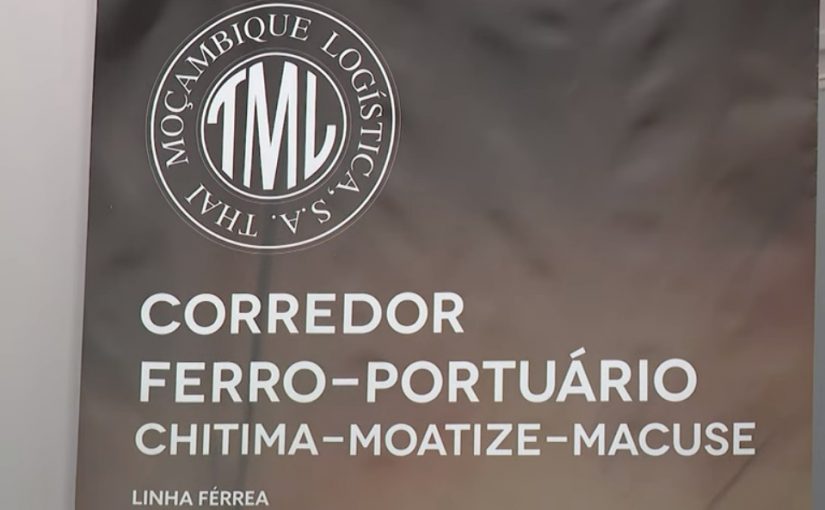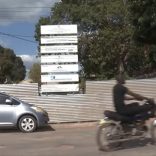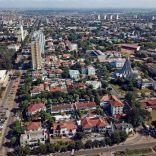Mozambique expects to sign a new program with the IMF this year
Macuse Logistics Corridor: Still no date for the start of railway line works – Carta

Screen grab: TVM
There is still no definitive date for the start of work on the Macuse Logistics Corridor, whose railway line will cover about 500 kilometres between the village of Chitima, in Tete province, and the future deep-water port of Macuse, in Zambézia province.
The construction works of the Chitima-Macuse railway and the Macuse deep water port should have started in the first quarter of 2016 and the infrastructure should have been operational by 2020. However, nothing has happened yet.
This Thursday morning, Thai Moçambique Logística, S.A., concessionaire of the project, told journalists that the construction of the railway line was dependent on winning over customers, especially mining companies and hinterland countries like Zambia and Zimbabwe.
“In relation to the railroad, today we have to deal with a broader dimension than just coal. Today, it is a logistical corridor, it has other implications, another complexity. Global circumstances in relation to coal demand we be more creative, so we need the participation of other players, namely, the mining companies and hinterland development in Zambia and Zimbabwe,” said José Fonseca, member of the Executive Committee of Thai Moçambique Logística, stressing that customers were the key element in the success of projects of this type.
“We are raising awareness among mining companies to embrace this project, because they are anchors in the economic development of the corridor and the coal market is very favourable at the moment,” Fonseca added, revealing that a census to determine the real number of families covered by the railroad was underway.
As for the deep water port in Macuse, Zambézia province, the scenario is different. Work will start as soon as the resettlement process of the affected families, forecast for August 2023, is finished.
“The port infrastructure work was a priority because it is linked to a faster financing process. We have already received approval from the Bank of Mozambique and public entities and, therefore, we will move forward with the port operation,” Fonseca said, noting that the project was scheduled to last 36 months.
Fonseca represents the Thai company Italian-Thai Development, which holds 60% of the shares in Thai Moçambique Logística. He also explained that, in the case of the Port of Macuse, there was already a memorandum of understanding between the concessionaire and Portucel Moçambique for the development of the forest and use of the infrastructure for the flow of products from the region.
Confronted with information broadcast by STV, according to which Italian-Thai Development was leaving the project, Fonseca replied: “On behalf of Italian-Thai Development, I can reaffirm that, together with TML [Thai Moçambique Logística], we are fully committed to the success of this project and we are doing everything in our power to complete the development of this rail-port project, which is extremely important for Mozambique”.
Citing lawyer Abdul Carimo, a member of CODIZA (Corredor de Desenvolvimento Integrado da Zambézia), one of the TML shareholders, STV reported that the Thai group no longer wished to continue with the rail-port project, but there was already interest from Indian investors. However, “the problem to be addressed is how much the Indians will pay the Thais”.
According to Fonseca, the Thai group remains committed to the project, and still leads the technical and financial aspects. He said, for example, that resettlement works currently underway in the community of Sopinho, Quelimane municipality, Zambézia province, are being funded by the Thai group, at a cost of approximately US$20 million.
This includes the construction of about 90 Type 3 houses, a school, health centre, maternity hospital, market, police station, water supply system, two sports complexes (one covered) and the rehabilitation of the road between Sopinho and Zalala, including its three bridges.
“Italian-Thai Development has financed the project since 2014, in terms of its technical and economic feasibility. Conditions obtain to bring the project to a successful conclusion, despite the difficulties that have arisen along the way,” Fonseca stressed.
Thai Moçambique Logística is a public-private partnership made up of Caminhos de Ferro de Moçambique (20%), the Zambézia Integrated Development Corridor (20%) and the Thai company Italian-Thai Development (60%).
The Macuse rail-port project is budgeted at approximately US$2.7 billion, and has been delayed for six years.
By A. Maolela
Watch the TVM report.












Leave a Reply
Be the First to Comment!
You must be logged in to post a comment.
You must be logged in to post a comment.